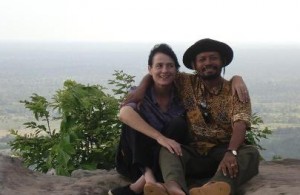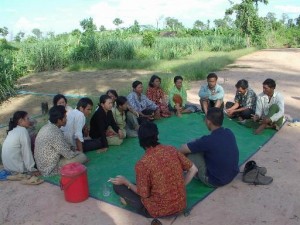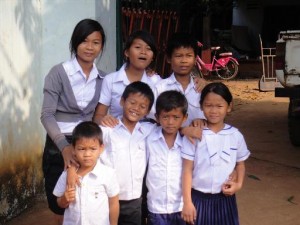“I came across an advertisement through the internet about the RKC program for the MBA in Leadership and Sustainability. It was these two words that attracted me so I applied and was accepted for the program – it was a great choice.” – Bernadette O’Neill
Bernadette O’Neill (Bernie) was born in a small farming community in Ireland. In the mid-1980s she volunteered to work in Africa for a development organization and knew that she had found her niche in life. Since then she has worked for development organizations in many countries in Africa and Asia, settling in Cambodia in the early 1990’s where she met her husband. In 2007, she became Country Director for ZOA, a Dutch NGO.
Kelly Boler: What do you do as a Country Director?
Bernadette O’Neill: As Country Director, I am responsible for all the work of ZOA in Cambodia. Our work concentrates on supporting the resettlement of families previously displaced by civil strife and poverty. As these families mainly settle in remote rural areas, our work focuses around agriculture. A great challenge is climate change which is causing hardship to farmers as the rainfall patterns continue to be erratic so water management and other vulnerability mitigation measures are an important part of our work. To support our projects with these newly settled families, I have to prepare project proposals to donors to access funds, recruit and train staff to implement the projects, monitor the works in progress and prepare reports to all stakeholders. The most interesting part of the work is the regular visits to the beneficiary groups where is it rewarding to see the positive changes in their livelihoods brought about by our work with them.
K.B. What drew you to do your degree at RKC?
B.O. It was sort of accidental!! I had been thinking for some time of pursuing a degree in a field more relevant to my work than my accounting background and some friends suggested an MBA. I did not feel that an MBA was what I wanted but then came across an advertisement through the internet about the RKC program for the MBA in Leadership and Sustainability. It was these two words that attracted me so I applied and was accepted for the program – it was a great choice. I am not particularly religious but sometimes I feel there is some divine guidance to our lives and what I call “accidental” can often be someone guiding us in the right direction.
K.B. Have you done your residency?
B.O. I attended the Residency in Cumbria at the end of 2011. What a wonderful experience! The anticipation beforehand of meeting our “virtual” colleagues in person was rewarded with some animated discussions and sharing of experiences. It was kind of strange walking into a college campus after an absence of over 25 years but the professors were brilliant and the program was stimulating.
K.B. Do you have suggestions for students thinking about their upcoming residencies?
B.O. For students planning their residency, I think it is important to “blank out” that week; don’t come cluttered with other things on your mind (either work, personal or other RKC courses). Normally you will take your residency in the middle of another course so make sure you are up to date with that course work and then forget about it for a week. This is possible because you will be given an extra week’s extension if any exams are planned around your residency. Coming with your mind free will give you more time for social interaction with your colleagues which is as rewarding as the discussions at the University.
K.B. What are your plans for your career post-graduation, and how do you think this degree or what you have learned effect it?
B.O. I will continue to work for development projects in Cambodia but now we have just phased out the ZOA program (as ZOA focuses on countries emerging from conflict and now Cambodia is past that stage), so I am taking a break for now but doing short term consultancies where they interest me.
I did not really do this degree to improve my career. I did it for the joy of just learning again – although I had always said that we learn more from practice than from study, it was most interesting to see how our practical knowledge is supported by various academic studies. Nevertheless it certainly enhances my reputation among my colleagues and future employers. Doing this MBA has also enhanced my capacity for research and showed me how much we can learn from previous research into subjects of interest to us.
K.B. What has been the best part of your experience doing this online degree?
B.O. It has been such fun over the past two years that it is difficult to say what was the best part. Certainly exploring new subjects was stimulating but probably the best part was the interaction with other students and tutors. I now have a great number of additional friends all over the world, many of whom I will continue to keep in touch with.
K.B. What do you enjoy doing? Hobbies, pastimes?
B.O. When I was younger I loved playing all kinds of sports – hurling (a unique Irish game), football, squash and running. Now I am a bit older I focus more on long walks and watching other (younger) people playing these sports. I love reading and get through a few books a day on my days off if I am alone – but I live in such a lovely place (Cambodia) where people are always dropping around for a chat that time alone is rare but these discussions with family, friends and neighbors are always stimulating. Apart from these things, I love travel – whether by bike, car, train, boat or airplane – and meeting new people.
K.B. What is your favorite local food?
B.O. There is such a range of great food in Cambodia that it is difficult to say which is my favorite. Because I love to eat a big breakfast and then just top up a bit throughout the day, I could say that the best start for me is a big plate of rice topped with chicken liver, red chilies, garlic and lemons, washed down with a nice beef soup and a strong coffee. Maybe not everybody’s ideal start to the day but if I fill up with that I can go the whole day without anything else if necessary (until evening time of course, when the need for a beer sets in! – and my favorite snack with the evening beer is fried frogs in garlic sauce).
K.B. What is the perfect day?
B.O. A perfect day is of course a day when at the end of it I feel satisfied that I have achieved what I set out to do – sometimes this may relate to work (as in submitting a proposal within the deadline) or personal like sorting out family issues.
K.B. What is the perfect working day?
B.O. I love a day with a mixture of things to do, not just doing the same thing for the whole day – fortunately for me, most of my days are highly varied. The perfect working day includes some travel, meeting with project staff and target groups in their villages and feeling at the end of the day that I have achieved something.
K.B. Are you reading anything right now?
B.O. Since I finished the research for my dissertation at the end of January, I have taken a bit of a break from serious reading as I read so much leading up to that. So my current books are more light reading – some interesting stories of people’s lives around the world (e.g. a prostitute in Brazil, a coal-miner in Chile, etc.).
K.B. Do have any favorite books about business that have influenced you?
B.O. Regarding business books, a book that really inspired me was one of the books recommended to us during our marketing studies at RKC as it looks at business leadership that combines profit making with sustainability – that is Let My People Go Surfing by Yvon Chouinard. It is a book that should be read more than once to absorb the learnings from it.
K.B. What is your motto?
B.O. I can come up with no personal motto greater than the words given to us by God – “Love your neighbor as yourself.” It is very difficult to put into practice but keeping it in mind can help us to avoid selfishness and greed which are two things that drive injustice in our world and lead to unsustainable use of resources.



